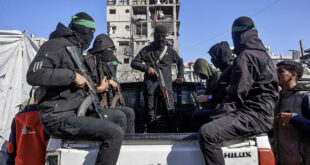BEIRUT (AFP) — Free of the shackles of its powerful neighbour Syria, Lebanon votes on Sunday in what is being hailed as the first truly free elections in three decades — with the anti-Damascus opposition set to win.
Many of Syria’s once-powerful allies have already thrown in the towel and key opposition figures including veteran Druze leader Walid Jumblatt and Saad Hariri, son of slain ex-prime minister Rafiq Hariri, are assured of victory.
The real litmus test for the opposition, which is offering Lebanon’s more than two million voters no real manifesto, will be the turnout — a key indicator of any new government’s legitimacy.
The four-round election, which kicks off on May 29 in Beirut to be followed by three more rounds on consecutive Sundays, is the first to take place under international supervision.
Nine candidates on Saad Hariri’s list have already been elected without a single vote being cast, and another 10 are almost assured of victory.
Huge portraits of Rafiq Hariri, whose killing in a massive St Valentine’s Day bomb blast triggered a political upheaval in Lebanon and ultimately forced Syria’s exit last month, are posted all over Beirut along with those of Saad.
Little space is left for candidates competing against the Hariri list.
Saad called on “those who loved Rafiq Hariri and believed in his economic and political vision to vote en masse… so that the truth will come out†about the murder.
“We are a peaceful people. That is why I call on you to respond to the killers [of Hariri] by casting your votes so that each one hits them in the heart,†he has repeated throughout the campaign.
In the Christian district of Ashrafiyeh, Hariri’s portraits are side by side with those of Solange Gemayel, widow of slain president and former Christian warlord Bashir Gemayel, who has won uncontested Beirut’s sole Maronite seat.
A few posters warn, however, that “the electoral law in force will not guarantee Christian representationâ€, echoing the words of Cardinal Nasrallah Sfeir, the head of the powerful Maronite Church.
Lebanon’s large Christian minority feel that the Syrian-tailored law, used in the last 2000 polls, bolsters Muslim representation at their expense.
In the Shiite heartland of southern Lebanon where the second stage of the polls takes place on June 5, election fever is weak amid a lack of candidates willing to compete against the joint Amal-Hizbollah list.
The two pro-Syrian Shiite movements expect their 23 candidates to sweep the polls in the region. The same is the case in Shiite-dominated areas of the Bekaa Valley in eastern Lebanon.
But in Mount Lebanon, a region southeast of Beirut split into Christian, Druze and Shiite areas, and in the Christian northern regions of Kesrouan, Metn and Jbeil, campaigning is tough because of the large number of candidates.
The opposition has failed to strike up an alliance with the Free Patriotic Movement of General Michel Aoun, who led a disputed military government in the dying days of the 1975-1990 civil war and was booted into exile by the Syrians.
A leading Christian figure who made a triumphant homecoming earlier this month, Aoun has criticised opposition members in the Muslim camp for bowing to the government’s terms for the elections.
The opposition could also emerge victorious in Tripoli, a Sunni stronghold in northern Lebanon, after former pro-Syrian prime minister Omar Karameh announced he would not be standing for reelection in his home city.
But a low turnout could still play into the hands of pro-Syrian candidates in Tripoli, where the Lebanese Islamist movement Jamaa Islamiya, an electoral force in the city, has announced it will boycott the polls.
Lebanon has some three million voters, 59 per cent Muslim and 41 per cent Christian, who will be asked to elect a 128-seat parliament equally divided between the two communities.
 Eurasia Press & News
Eurasia Press & News



